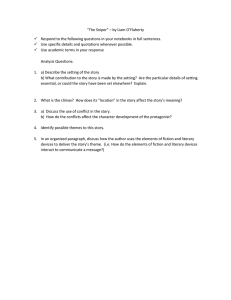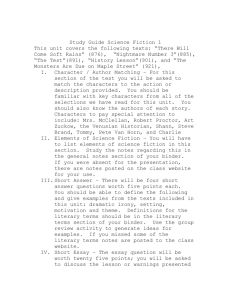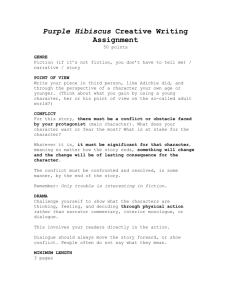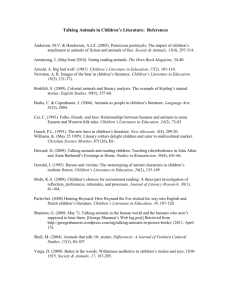Part One: Short Story and Essay Response
advertisement
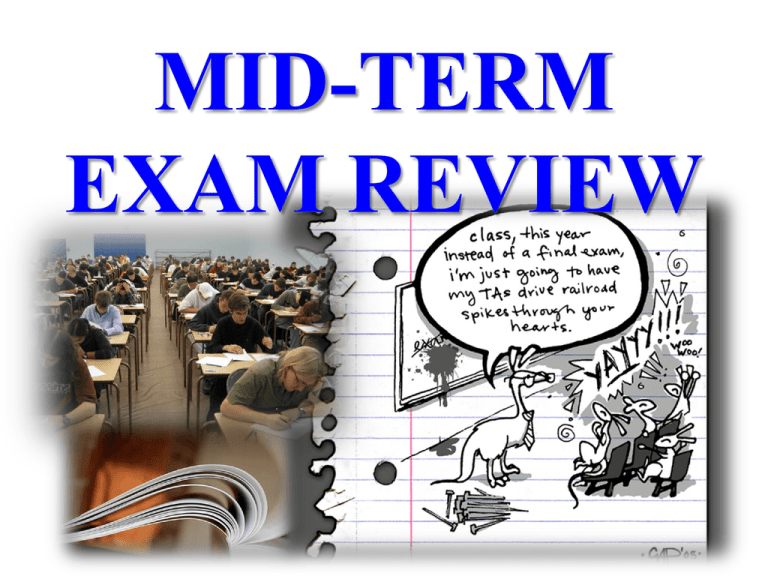
MID-TERM EXAM REVIEW Format • Part One: essays Based on Short Story– 50% • Part Two: Literary Terms – 10% (multiple choice pertaining to short story) • Part Three: Editing & Revising– 20% (multiple choice) • Part Four: Quote Analysis– 12% (short answer) • Part Five: Semester Literature-- 8% (multiple choice) Part One: Short Story and Essay Response • You will read a short story you have never read before • IMPORTANT: Read quickly while still concentrating on understanding the story. • Be prepared to write about the short story in terms of its message, your connections to it, and whether it is good literature. • Since this is worth 50% of your exam grade, it would make sense to devote 50% of your exam time to it. • The total exam time is 90 minutes. • 50% = 45 minutes to both read and write. Scoring Criteria • forming understanding • developing interpretation • making connections • demonstrating critical stance Part Two: Literary Terms • • • • • This section is worth 10% of your exam grade. You should take about 10 minutes on it. There are 10 multiple choice questions. The questions are about the short story. They focus on literary terms (the elements of fiction) • These are carefully crafted questions so be careful. • You have to choose the best answer. Elements of Fiction •Setting •Character •Plot •Point of View •Theme •Symbolism •Other Other Fiction Elements •Allusion: a reference to a person, place or literary, historical, artistic, mythological source or event. “It was in St. Louis, Missouri, where they have that giant McDonald’s thing towering over the city…”(Bean Trees 15) •Atmosphere: the prevailing emotional and mental climate of a piece of fiction. •Protagonist: The leading character in a literary work. Holden in The Catcher in the Rye, Taylor in The Bean Trees. •Antagonist: The character who opposes the protagonist. •Dialogue: the reproduction of a conversation between two of the characters. Other Elements Continued •Foreshadowing: early clues about what will happen later in a piece of fiction. •Irony: a difference between what is expected and reality. •Style: a writer’s individual and distinct way of writing. The total of the qualities that distinguish one author’s writing from another’s. •Structure: the way time moves through a novel. •Chronological: starts at the beginning and moves through time. •Flashback: starts in the present and then goes back to the past. •Circular or Anticipatory: starts in the present, flashes back to the past, and returns to the present at the conclusion. Part Three: Editing & Revising • This is a set of 3 CAPT Editing & Revising tests. • You must read a passage and then answer multiple choice questions related to grammar and punctuation. • They are not easy questions. Be careful. • Give yourself about 15 minutes to complete this 20-point section of the exam. Part Four: Quote Analysis • This section is worth 12% of the exam points. • Suggested time allotment: 15 minutes • You will be given 3 quotes from the works we have read this semester. • Each one is worth 4 points. • You should have no trouble recognizing the quotes if you have read our books carefully. What You Have to Do… • Name the book, identify the speaker, and describe the scene – 2 pts. • Explain how the quote relates to a theme from the book– 2 pts. Part Five: Literature • This section is worth 8% of the exam points. • Suggested time allotment: 5 minutes • You will be given 16 multiple choice questions about the works we have read this semester. • Each one is worth 1/2 point. • When you finish this section, go back and review your whole test. If you “budget” your time, you should have a few minutes left to check your answers. (Be especially careful not to take too long reading the short story.) GOOD LUCK!
